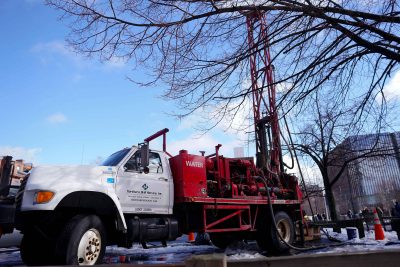
Since Boston University released its Climate Action Plan in December 2017, several BU organizations have being working to keep the university on track to meet its goal of becoming carbon-neutral by 2040.
The plan was developed by university faculty, staff and students appointed to a Climate Action Plan Task Force and outlines strategies for the university to implement in order to become more sustainable, such as by reducing energy consumption and building weather-resilient infrastructure.
Lisa Tornatore, the sustainability director for sustainability@BU, said that one of the major goals she and her team have been focusing on is reducing the university’s greenhouse gas emissions.
In September, BU entered into a contract with utility company Engie to buy renewable wind power in South Dakota. Although BU will continue to purchase electricity from New England, the power it buys from Engie will be sold to the Midwest for energy credits.
“BU Wind is the most significant step to reach that goal,” Tornatore said. “This renewable energy project will generate enough electricity to match the university’s demand for electricity every year for 15 years.”
Tornatore said the next step is exploring the feasibility of adding solar panels to BU buildings, which she said could reduce emissions from energy consumption by 31 percent by 2032.
“Now that BU Wind is secured with construction scheduled to begin this spring,” she said, “we will queue up a study for campus solar and build the capacity to begin the hard work to reduce the university’s energy consumption.”
In December 2017, the City of Boston also released a Climate Action Plan, in partnership with the Green Ribbon Commission, BU’s Institute for Sustainable Energy and BU’s Earth and Environment Department, with the goal of making the city carbon-neutral by 2050.
Curtis Woodcock, a professor of earth and environmental in the College of Arts and Sciences, said he agrees with the steps BU has taken thus far and believes the school is moving in the right direction to become more sustainable.
“This plan to buy electricity from this wind farm in South Dakota makes tremendous amount of sense and shows a lot of forethought,” Woodcock said.
Maxwell Bronfeld, a freshman in CAS, said he is optimistic about BU’s Climate Action Plan and believes the university will meet its 2040 goals.
“BU is consistently making strides to increase its sustainability, which I think it should continue to do,” Bronfeld said. “On top of this I believe the roofs of all dorms and buildings should have solar panels installed. The BU bus infrastructure could also be easily changed from diesel to electric, or even fuel cell technology, to reduce the emissions from the school.”
Linden Vo, a junior in the College of Engineering, said he has read the Climate Action Plan before and believes the work ahead for BU to reach its carbon-neutral goal will require a joint effort by everyone at the university.
“It sounds like a very promising idea, but there is a lot of work that needs to be done obviously, and in some aspects, it seems almost unrealistic,” Vo said. “But I think that if everyone contributes to the effort as a whole, then we can make a giant lead forward. We may reach the goal, we may not, but at the end of the day, it’s about saving the planet.”
CAS sophomore Zach Nelson said he supports BU’s Climate Action Plan and looks forward to a more informed and more energy-efficient campus life in the coming years.
“I think BU is stepping into the right direction,” Nelson said. “I think any step that BU can take to defer climate is really important. I think it is really cool that BU is going carbon-neutral because in retrospect, I don’t know how much people are doing on campus to help deal with climate change.”




















































































































